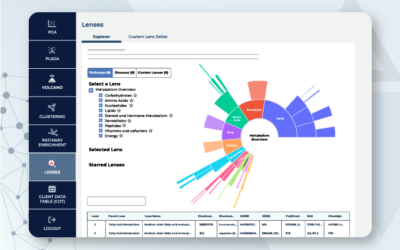Over a decade of research has solidified the role that the microbiome plays in human health and disease. But the why and how of this relationship is not rooted in simply what microbes are present but also what those microbes are doing. Metabolites—both microbial and human—are the cornerstone of this bidirectional relationship that can impact health in so many ways.
We have recognized the importance of microbial metabolites for quite some time. While recent research1 has emphasized that microbial metabolites are a better proxy of the gut ecosystem than microbial taxa, this was first described in the original Human Microbiome Project cohort.2 Nevertheless, the metabolic potential of the microbiome has been largely under-explored.
It is only by investigating and understanding the crosstalk between microbial and host metabolites that we will be able to advance our understanding of the relationship between ourselves and our microbes enough to leverage that relationship to develop novel disease diagnostics and therapeutics.
Current Microbiome Research is Limited
The vast majority of microbiome research has focused on identifying microbial taxa that are present or absent in a certain set of samples. While this is a necessary first step in any microbiome research study, stopping there is a mistake. Without going beyond just sequencing, you’ll never extract functional information, biological insights into host processes, or, critically, biological and mechanistic insights into disease processes.
Proceeding with live biotherapeutics and microbially directed drug development without filling in these knowledge gaps hamstrings those efforts from the get-go. Not only are such development efforts not designed to fill or capable of filling that knowledge gap, but, without an understanding of host-microbe metabolic interactions, the potential for off-target effects is significant.
Anyone embarking on a microbiome-based therapeutic without an intimate understanding of how their therapeutic influences metabolic interactions is essentially playing Russian roulette when they advance to preclinical and clinical trials because they simply can’t predict what might happen—and the risk of failure and lost time and financial resources is high.
Metabolomics Furthers Microbiome Research
Metabolomics—the large-scale study of metabolites and metabolic pathways—is the key to advancing the microbiome to the clinic. Once a nice-to-have addition to your scientific study, metabolomics analyses are now a must-have to truly advance microbiome research and therapeutic applications.
Metabolomics analyses have, for example, demonstrated that microbiome-derived metabolites—not specific species—are associated with fecal and blood metabolites of both human and microbial origin.1 This suggests that we should consider altering our approach to microbiome-based therapeutics from one largely emphasizing single species or a small consortium of specific species to one focused on functionally related microbial communities.
Other analyses have reported a significant association between blood metabolites and the diversity of the gut microbiome,3 demonstrating that metabolites could better predict diversity than even standard clinical laboratory tests. Monitoring microbiome diversity (and therefore, gut health) could really be as straightforward as a simple metabolic analysis of blood, which is an inexpensive, routine clinical procedure.
Metabolomics Brings the Microbiome Closer to the Clinic
While these research studies have led to the formation of promising hypotheses that must be further explored before bringing a novel microbiome-based diagnostic or therapeutic to the clinic, others are already leveraging metabolomics as a critical component of their clinical trials.
Metabolon scientists have worked closely with a leading biopharmaceutical company developing microbiome therapeutics for a range of conditions, from ulcerative colitis to recurrent Clostridiodes difficile infection. This company utilized Metabolon’s short chain fatty acid (SCFA) and bile acids (BA) targeted metabolomics panels to measure these microbially-derived metabolites in a phase 1B clinical trial to correlate changes in these metabolites with changes in microbiome composition resulting from their ulcerative colitis therapeutic.
In a phase 2 clinical trial, testing their C. difficile therapeutic, the researchers again utilized these two panels. They correlated bile acids—which inhibit C. difficile germination—with both their therapeutic and with C. difficile recurrence. The data enabled the researchers to gain a clearer picture of how their therapeutic changes the metabolic ecosystem in the gut, knowledge that they used to reanalyze their phase 1 data and then redesign their phase 3 clinical trial.
That therapeutic successfully advanced through the phase 3 trial, receiving Breakthrough Therapy designation and Orphan Drug designation for the prevention of recurrent C. difficile infection by the U.S. Food and Drug Administration.4 It is now positioned to be the first-ever microbiome-based therapeutic to receive full FDA approval. There is no better example of how metabolomics analyses can help realize the therapeutic potential of the microbiome that we have been anxiously awaiting for years.
Metabolon’s Microbiome Portfolio
Metabolon is proud to help companies like the one in the above example and others advance the development of microbiome-based therapies and disease diagnostics. Our microbiome profiling service, SCFA and Bile Acids Targeted Panels, which specifically detect microbially-derived metabolites, are a powerful add-on to our Global Discovery and Complex Lipids Targeted Panels. Together, this suite of panels, built off of Metabolon’s decades of experience across thousands of metabolomics studies, can help you maximize the discovery potential of your microbiome research projects. Contact us today to learn more about how Metabolon can help you advance your microbiome studies.
Contact us today to learn more.
References
- Visconti A, Le Roy CI, Rosa F et al. Interplay between the human gut microbiome and host metabolism. Nat Commun. 2019;10(1):4505. doi: 10.1038/s41467-019-12476-z
- The Human Microbiome Project Consortium. Structure, function and diversity of the healthy human microbiome. Nature. 2012;486(7402):207—14. doi: 10.1038/nature11234
- Wilmanski T, Rappaport N, Earls JC et al. Blood metabolome predicts gut microbiome α-diversity in humans. Nat Biotechnol. 2019;37(10:1217—1228. doi: 10.1038/s41587-019-0233-9
- McGovern BH, Ford CB, Henn MR, et al. SER-109, an Investigational Microbiome Drug to Reduce Recurrence After Clostridioides difficile Infection: Lessons Learned From a Phase 2 Trial. Clin Infect Dis. 2021;72(12):2132-2140. doi:10.1093/cid/ciaa387






